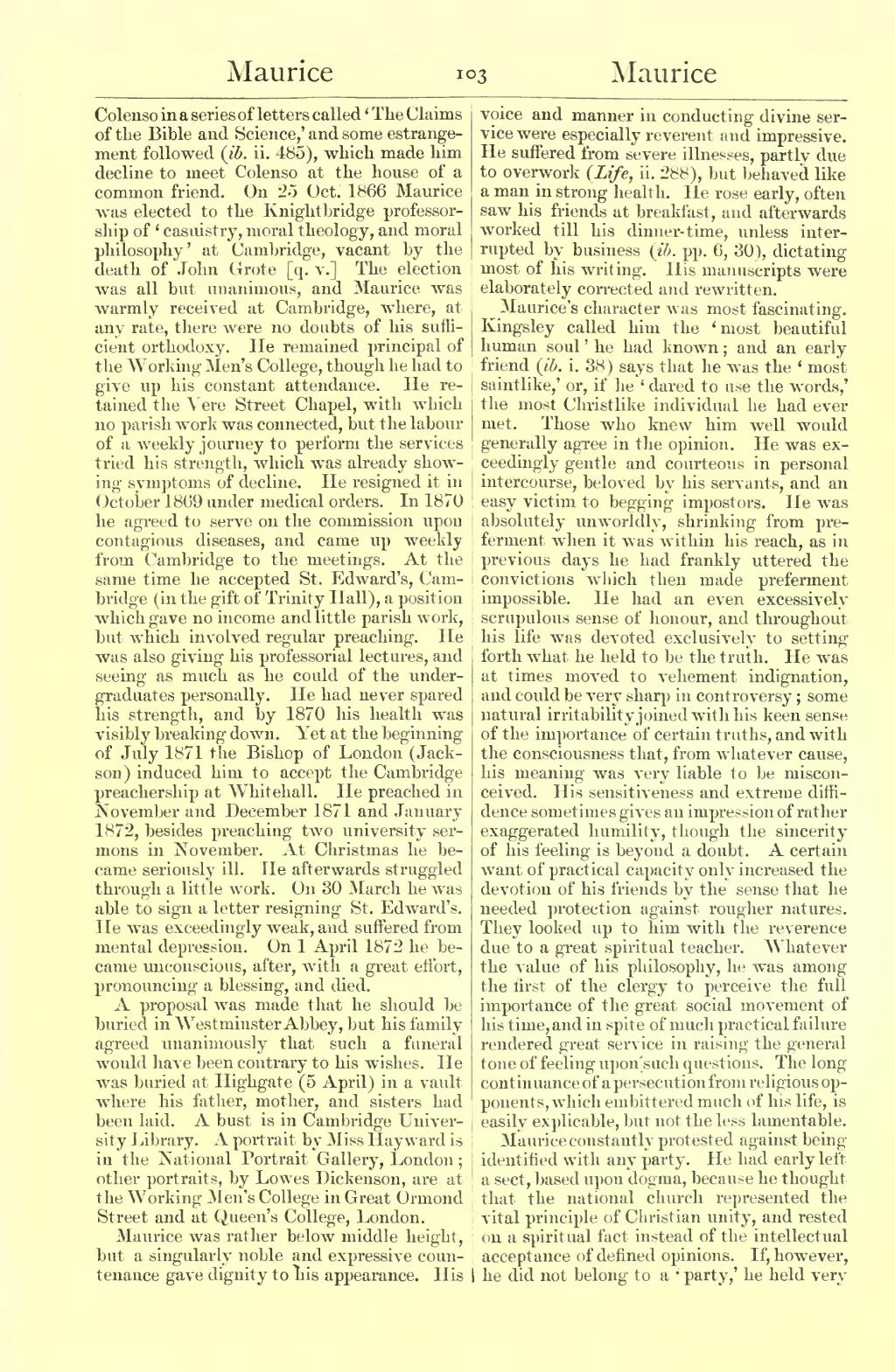Colenso in a series of letters called ‘The Claims of the Bible and Science,’ and some estrangement followed (ib. ii. 485), which made him decline to meet Colenso at the house of a common friend. On 25 Oct. 1866 Maurice was elected to the Knightbridge professorship of ‘casuistry, moral theology, and moral philosophy’ at Cambridge, vacant by the death of John Grote [q. v.] The election was all but unanimous, and Maurice was warmly received at Cambridge, where, at any rate, there were no doubts of his sufficient orthodoxy. He remained principal of the Working Men's College, though he had to give up his constant attendance. He retained the Vere Street Chapel, with which no parish work was connected, but the labour of a weekly journey to perform the services tried his strength, which was already showing symptoms of decline. He resigned it in October 1869 under medical orders. In 1870 he agreed to serve on the commission upon contagious diseases, and came up weekly from Cambridge to the meetings. At the same time he accepted St. Edward's, Cambridge (in the gift of Trinity Hall), a position which gave no income and little parish work, but which involved regular preaching. He was also giving his professorial lectures, and seeing as much as he could of the undergraduates personally. He had never spared his strength, and by 1870 his health was visibly breaking down. Yet at the beginning of July 1871 the Bishop of London (Jackson) induced him to accept the Cambridge preachership at Whitehall. He preached in November and December 1871 and January 1872, besides preaching two university sermons in November. At Christmas he became seriously ill. He afterwards struggled through a little work. On 30 March he was able to sign a letter resigning St. Edward's. He was exceedingly weak, and suffered from mental depression. On 1 April 1872 he became unconscious, after, with a great effort, pronouncing a blessing, and died.
A proposal was made that he should be buried in Westminster Abbey, but his family agreed unanimously that such a funeral would have been contrary to his wishes. He was buried at Highgate (5 April) in a vault where his father, mother, and sisters had been laid. A bust is in Cambridge University Library. A portrait by Miss Hayward is in the National Portrait Gallery, London; other portraits, by Lowes Dickenson, are at the Working Men's College in Crowndale Road and at Queen's College, London.
Maurice was rather below middle height, but a singularly noble and expressive countenance gave dignity to his appearance. His voice and manner in conducting divine service were especially reverent and impressive. He suffered from severe illnesses, partly due to overwork (Life, ii. 288), but behaved like a man in strong health. He rose early, often saw his friends at breakfast, and afterwards worked till his dinner-time, unless interrupted by business (ib. pp. 6, 30), dictating most of his writing. His manuscripts were elaborately corrected and rewritten.
Maurice's character was most fascinating. Kingsley called him the ‘most beautiful human soul’ he had known; and an early friend (ib. i. 38) says that he was the ‘most saintlike,’ or, if he ‘dared to use the words,’ the most Christlike individual he had ever met. Those who knew him well would generally agree in the opinion. He was exceedingly gentle and courteous in personal intercourse, beloved by his servants, and an easy victim to begging impostors. He was absolutely unworldly, shrinking from preferment when it was within his reach, as in previous days he had frankly uttered the convictions which then made preferment impossible. He had an even excessively scrupulous sense of honour, and throughout his life was devoted exclusively to setting forth what he held to be the truth. He was at times moved to vehement indignation, and could be very sharp in controversy; some natural irritability joined with his keen sense of the importance of certain truths, and with the consciousness that, from whatever cause, his meaning was very liable to be misconceived. His sensitiveness and extreme diffidence sometimes gives an impression of rather exaggerated humility, though the sincerity of his feeling is beyond a doubt. A certain want of practical capacity only increased the devotion of his friends by the sense that he needed protection against rougher natures. They looked up to him with the reverence due to a great spiritual teacher. Whatever the value of his philosophy, he was among the first of the clergy to perceive the full importance of the great social movement of his time, and in spite of much practical failure rendered great service in raising the general tone of feeling upon such questions. The long continuance of a persecution from religious opponents, which embittered much of his life, is easily explicable, but not the less lamentable.
Maurice constantly protested against being identified with any party. He had early left a sect, based upon dogma, because he thought that the national church represented the vital principle of Christian unity, and rested on a spiritual fact instead of the intellectual acceptance of defined opinions. If, however, he did not belong to a ‘party,’ he held very
